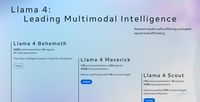Meta Platforms has officially released its latest iteration of large language models, introducing the Llama 4 series, which includes the Llama 4 Scout and Llama 4 Maverick. The announcement, made on Saturday, marks a significant leap in the company’s efforts to lead in the generative AI space amidst fierce competition from other tech giants.
Both models are now available for download on llama.com and Hugging Face, as well as through Meta AI products on platforms like WhatsApp, Messenger, and Instagram Direct. These models are touted as Meta's most advanced to date, capable of handling multimodal tasks that involve text, images, and video.
Llama 4 Scout is equipped with 17 billion active parameters and 16 experts, designed to operate efficiently on a single H100 GPU. It boasts an impressive 10 million token context window, allowing it to manage extensive documents and complex data processing tasks effectively. According to Meta, this model is particularly adept at multi-document summarization and reasoning over large codebases.
On the other hand, Llama 4 Maverick, which also features 17 billion active parameters, utilizes a more extensive architecture with 128 experts and a total of 400 billion parameters. This model is aimed at higher-end applications, showing competitive performance against larger models like DeepSeek V3. Meta's CEO Mark Zuckerberg described Maverick as a "workhorse" for larger-scale tasks, stating, "Maverick beats GPT-4o and Gemini Flash 2 on all benchmarks while remaining smaller and more efficient than DeepSeek-V3." This model has already scored an ELO of 1417 on LMArena in experimental chat settings, showcasing its superior capabilities.
The Llama 4 series is built on a mixture-of-experts (MoE) architecture, a design choice that enhances computational efficiency by activating only the necessary parameters for specific tasks. This innovation allows for a more streamlined operation, reducing latency and operational costs. The models were distilled from the yet-to-be-released Llama 4 Behemoth, a massive teacher model with 288 billion active parameters and nearly two trillion total parameters.
Meta's commitment to openness is evident in the release of these models under open terms, with broader access anticipated through cloud providers and partners. The company emphasizes that openness fosters innovation, a sentiment echoed in their blog post announcing the models. As part of its strategy, Meta plans to host LlamaCon on April 29, where further details about its vision for the Llama platform will be shared.
The launch of Llama 4 comes in response to the rapidly evolving AI landscape, particularly following the success of DeepSeek's open-source language reasoning model, which reportedly outperformed many existing models at a fraction of the cost. This event prompted Meta to accelerate its own development efforts, leading to the unveiling of the Llama 4 series.
Meta has also updated its AI-powered assistant across applications, now utilizing Llama 4 in 40 countries, although the multimodal features are currently limited to English speakers in the U.S. This rollout reflects Meta's ambition to integrate advanced AI capabilities into its existing platforms.
However, not all is smooth sailing for Meta. The company has faced criticism regarding the licensing terms for Llama 4, particularly concerning users and companies based in the EU, who are prohibited from using or distributing the models due to stringent governance requirements imposed by regional AI and data privacy laws. This has raised concerns among developers who feel that such restrictions could limit the accessibility of these advanced tools.
In terms of performance, both Llama 4 Scout and Maverick have been benchmarked against competing systems. Maverick has demonstrated superior results over models such as OpenAI's GPT-4o and Google's Gemini 2.0 in various coding, reasoning, and image tasks. Scout, with its unprecedented context window, stands out for its ability to process lengthy documents and complex queries without losing context.
Meta has also made strides in addressing concerns about bias in AI responses. The company claims that Llama 4 is "dramatically more balanced" in its approach to contentious topics compared to previous models, aiming to provide factual responses without judgment. This adjustment comes amid ongoing debates about the perceived political bias of AI chatbots, a topic that has garnered attention from various political figures and commentators.
Looking ahead, Meta plans to release the Llama 4 reasoning model, with further details expected next month. The company is positioning itself as a leader in the open-source AI movement, asserting that its models will not only compete with proprietary systems but also offer developers flexibility and cost-effectiveness.
As the AI landscape continues to evolve, Meta's release of the Llama 4 series represents a significant milestone in its journey to develop powerful, multimodal AI systems. With the promise of future advancements and a commitment to openness, Meta aims to reshape how AI interacts with users across its platforms.
In summary, the launch of Llama 4 Scout and Maverick marks a pivotal moment for Meta, as it seeks to redefine the capabilities of AI while navigating the complexities of regulatory environments and competition in the tech industry.





